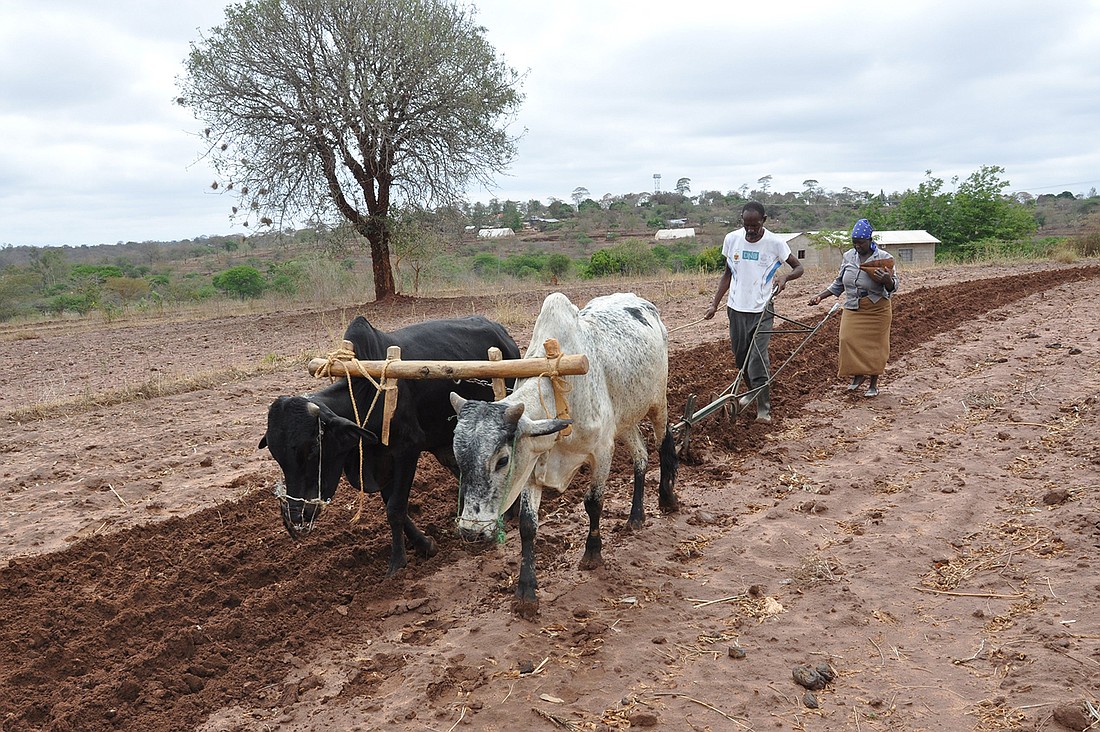Farm Bill provides critical funding for fight against hunger in developing countries
September 7, 2023 at 9:39 a.m.

Catholic Relief Services, an official agency of the U.S. bishops, advocates for the vulnerable in developing countries. For members of the Diocese of Trenton Chapter of CRS this advocacy takes many forms. Since last year, we have been contacting and meeting with the staff of our members of Congress, writing letters to the editor, and educating the public about the importance of the Farm Bill in helping those suffering food insecurity throughout the world.
The current Congress has the opportunity to take critical action in the fight against world hunger through the re-authorization of the Farm Bill. While the majority of the Farm Bill focuses on domestic spending, there is an important one percent that provides funding for international programs directed at food production and alleviation of hunger in developing countries. Far from being handouts that never move people out of positions of dependency on international assistance, these are programs that assist farmers and communities to improve the fertility of their land, enable farmers to provide food for their families and their local communities, increase the capacity of local farmers to consistently provide nutritious food in the necessary quantities, promote local economies, and implement sustainable practices that lead people to independence and resiliency.
The Farm Bill contains four major programs that have cut hunger in the developing world: Food for Peace, the McGovern-Dole Food for Education Program, Food for Progress and Farmer-to-Farmer. Together these programs provide emergency assistance during disasters and help promote sustainability and resiliency in the local economies where farmers are struggling to respond to prolonged droughts, shortages of fertilizer and the effects of conflict.
An overview follows:
• Since 1954, Food for Peace has provided emergency food assistance and worked with communities to improve and sustain their food and nutrition security through non-emergency programs.
• McGovern-Dole Food for Education has ensured that children are not struggling to learn on empty stomachs. In Fiscal Year 2021, this program reached more than 4 million children, women and families.
• Food for Progress works to train farmers in animal and plant health, improve farming methods, develop road and utility systems, establish cooperatives for farmers, provide microcredit or small loans at low interest and develop agricultural systems.
• Farmer-to-Farmer uses volunteer farmers and agricultural experts from the U.S. to work with local farmers to work out the best solutions to their problems and help them implement best practices.
The current Farm Bill was re-authorized in 2018 when no one could foresee the challenges that have been caused by COVID-19, the grain and fertilizer shortages caused by the war in Ukraine, local political conflicts that jeopardize people’s ability to remain in their communities and carry on their livelihoods, or natural disasters and changes in climate that have affected agricultural conditions. After decades of progress in decreasing hunger and promoting the independence of farmers in developing countries, these events are making progress harder to achieve. They underscore the importance of ensuring that the U.S. continues to provide funding for programs that foster sustainability and resiliency and are capable of responding to the challenges the next five years will present.
Some might look at this international assistance as a convenient place to cut funding and decrease the size of the Farm Bill. This is shortsighted in a number of ways. If the achievements of these programs do not continue, the result will be an ongoing need to provide emergency assistance to these countries when they are experiencing crop failures, famine, disease outbreaks, water shortages and the instability brought about by conflict. New waves of migration will occur as people move from their homes seeking food for themselves and their families.
The re-authorization of the Farm Bill is a critical opportunity for us to bring lasting change to families and communities. The Farm Bill allows U.S. funding for international humanitarian and development work to reach vulnerable communities as effectively and efficiently as possible. Congress needs to ensure that this funding is available for the next five years.
Olivieri serves as co-leader, Diocese of Trenton Chapter of CRS.
Related Stories
Monday, December 15, 2025
E-Editions
Events
Catholic Relief Services, an official agency of the U.S. bishops, advocates for the vulnerable in developing countries. For members of the Diocese of Trenton Chapter of CRS this advocacy takes many forms. Since last year, we have been contacting and meeting with the staff of our members of Congress, writing letters to the editor, and educating the public about the importance of the Farm Bill in helping those suffering food insecurity throughout the world.
The current Congress has the opportunity to take critical action in the fight against world hunger through the re-authorization of the Farm Bill. While the majority of the Farm Bill focuses on domestic spending, there is an important one percent that provides funding for international programs directed at food production and alleviation of hunger in developing countries. Far from being handouts that never move people out of positions of dependency on international assistance, these are programs that assist farmers and communities to improve the fertility of their land, enable farmers to provide food for their families and their local communities, increase the capacity of local farmers to consistently provide nutritious food in the necessary quantities, promote local economies, and implement sustainable practices that lead people to independence and resiliency.
The Farm Bill contains four major programs that have cut hunger in the developing world: Food for Peace, the McGovern-Dole Food for Education Program, Food for Progress and Farmer-to-Farmer. Together these programs provide emergency assistance during disasters and help promote sustainability and resiliency in the local economies where farmers are struggling to respond to prolonged droughts, shortages of fertilizer and the effects of conflict.
An overview follows:
• Since 1954, Food for Peace has provided emergency food assistance and worked with communities to improve and sustain their food and nutrition security through non-emergency programs.
• McGovern-Dole Food for Education has ensured that children are not struggling to learn on empty stomachs. In Fiscal Year 2021, this program reached more than 4 million children, women and families.
• Food for Progress works to train farmers in animal and plant health, improve farming methods, develop road and utility systems, establish cooperatives for farmers, provide microcredit or small loans at low interest and develop agricultural systems.
• Farmer-to-Farmer uses volunteer farmers and agricultural experts from the U.S. to work with local farmers to work out the best solutions to their problems and help them implement best practices.
The current Farm Bill was re-authorized in 2018 when no one could foresee the challenges that have been caused by COVID-19, the grain and fertilizer shortages caused by the war in Ukraine, local political conflicts that jeopardize people’s ability to remain in their communities and carry on their livelihoods, or natural disasters and changes in climate that have affected agricultural conditions. After decades of progress in decreasing hunger and promoting the independence of farmers in developing countries, these events are making progress harder to achieve. They underscore the importance of ensuring that the U.S. continues to provide funding for programs that foster sustainability and resiliency and are capable of responding to the challenges the next five years will present.
Some might look at this international assistance as a convenient place to cut funding and decrease the size of the Farm Bill. This is shortsighted in a number of ways. If the achievements of these programs do not continue, the result will be an ongoing need to provide emergency assistance to these countries when they are experiencing crop failures, famine, disease outbreaks, water shortages and the instability brought about by conflict. New waves of migration will occur as people move from their homes seeking food for themselves and their families.
The re-authorization of the Farm Bill is a critical opportunity for us to bring lasting change to families and communities. The Farm Bill allows U.S. funding for international humanitarian and development work to reach vulnerable communities as effectively and efficiently as possible. Congress needs to ensure that this funding is available for the next five years.
Olivieri serves as co-leader, Diocese of Trenton Chapter of CRS.









